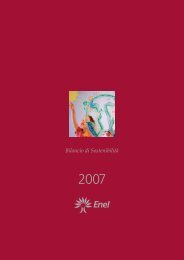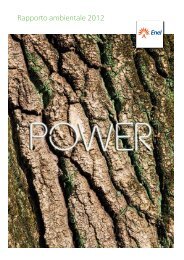Annual Report 2010 - Enel.com
Annual Report 2010 - Enel.com
Annual Report 2010 - Enel.com
You also want an ePaper? Increase the reach of your titles
YUMPU automatically turns print PDFs into web optimized ePapers that Google loves.
Operation of the Mercado de Corto Plazo (MCP)<br />
The draft Supreme Decree introducing amendments to<br />
the operating rules of the Mercado de Corto Plazo (MCP)<br />
was published in June. The changes are designed to increase<br />
the transparency of the market (requiring market<br />
agents to declare their expected demand for the subsequent<br />
day).<br />
With the Decreto de Urgencia 079/<strong>2010</strong> of December 16,<br />
<strong>2010</strong>, the Decreto de Urgencia 049/2008 was extended<br />
until December 31, 2013. The extension was made necessary<br />
by the delay in approving draft law 4335-<strong>2010</strong>-PE<br />
(amending Law 28832), which will introduce a permanent<br />
mechanism to reduce the risk of high marginal costs<br />
for the system in the event of transmission grid congestion.<br />
The government estimates that by the end of 2013,<br />
thanks in part to infrastructure upgrades, the crisis situation<br />
that prompted the adoption of the Decreto de Urgencia<br />
049/2008 should have been resolved.<br />
Remuneration of distribution activities<br />
OSINERGMIN has announced a new calculation of the<br />
VAD (Valor Agregado de Distribución) for distribution<br />
<strong>com</strong>panies in response to a number of objections raised by<br />
Luz del Sur concerning the VAD set in November 2009 for<br />
the November 2009 - October 2013 period. The change<br />
slightly reduces (0.1%) the distribution rate from the level<br />
approved in November 2009. On October 4, <strong>2010</strong>, OSIN-<br />
ERGMIN established the definitive value for the VAD for<br />
Edelnor, which remains virtually unchanged (+0.1%), partially<br />
granting the appeal of the distribution <strong>com</strong>pany.<br />
Secondary natural gas market<br />
On August 5, <strong>2010</strong> the Ministry of Energy and Mineral<br />
Resources approved Supreme Decree 46-<strong>2010</strong>-EM, regulating<br />
the secondary gas market where gas and transport<br />
capacity is traded through electronic auctions held on<br />
MECAP (Mercado Electrónico de las subastas de Transferencia<br />
de Producción y/o Capacidad de Transporte a Firme<br />
de Gas Natural). Secondary gas market transactions may<br />
take the form of bilateral contracts for a transitional period<br />
of no more than one year. After that, only centralized<br />
auctions can be used. The creation of the secondary gas<br />
market means that the electricity sector will enjoy more<br />
flexible provisioning arrangements.<br />
International<br />
France<br />
60 <strong>Enel</strong> <strong>Annual</strong> <strong>Report</strong> <strong>2010</strong> <strong>Report</strong> on operations<br />
NOME Act<br />
In March <strong>2010</strong>, the Ministry for Energy distributed the first<br />
draft of the bill for the NOME Act (Nouvelle Organization<br />
du Marché de l’Electricité), setting out the main re<strong>com</strong>mendations<br />
of the Champsaur parliamentary <strong>com</strong>mittee.<br />
In June <strong>2010</strong> the French National Assembly examined<br />
the NOME Act at first reading, approving a substantively<br />
amended text on June 15, <strong>2010</strong>. After a number of major<br />
amendments introduced by the Senate (September 30,<br />
<strong>2010</strong>), the final text was approved by the National Assembly<br />
on November 24, <strong>2010</strong>, and published the following<br />
December 8.<br />
The NOME Act contains reform measures that will gradually<br />
open up the French electricity market to <strong>com</strong>petition<br />
and replace the TaRTAM rate for those end users who,<br />
after having opted for a contract with a free-market supplier,<br />
seek to benefit once again from regulated electricity<br />
supplies.<br />
The main <strong>com</strong>ponents of this reform are:<br />
> access to nuclear-generated base electricity for alternative<br />
suppliers at regulated prices (known as ARENH or<br />
“Accès Régulé à l’Electricité Nucléaire Historique”), for<br />
a 15-year transitional period, with volumes calculated<br />
annually on the basis of the volume of nuclear generation<br />
as a percentage of total consumption, with an annual<br />
ceiling of 100 TWh;<br />
> suppliers are required to adapt their requests for<br />
ARENH to the forecasts for the volume and profile of<br />
their portfolios and the share of nuclear energy used to<br />
cover consumption;<br />
> responsibility for allocating ARENH volumes to suppliers<br />
on an intra-year basis is assigned to CRE;<br />
> an entity independent of EDF and alternative suppliers<br />
will be charged with handling the exchange of information<br />
regarding ARENH, in order to ensure that EDF<br />
does not have access to sensitive information concerning<br />
individual suppliers;<br />
> as from 2013 the network operators may acquire<br />
ARENH power to offset the entire amount of network<br />
losses (currently about 30 TWh). The power allocated<br />
for this purpose will be added (with no ceiling) to the<br />
100 TWh allocated to alternative suppliers (the first version<br />
of the NOME Act had provided for an annual ceiling<br />
of 20 TWh);









